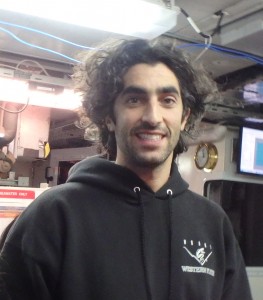Name:
Ryan A. Portner
Academic Background:
I am a geologist currently working as a postdoctoral research associate for Brown University. I also teach geology courses for Worcester State University in central Massachusetts. I moved to the east coast from Moss Landing, California where I did my first post-doc with the Monterey Bay Aquarium Research Institute (MBARI). I became interested in marine geology after studying oceanic rocks as part of my PhD studies at Macquarie University in Sydney Australia.
Current Area of Interest:
My primary research focus is in submarine volcanology and sedimentology. I am most interested in understanding submarine eruptions and ash dispersal through the ocean and along the seafloor. By combing observations of deposits around modern submarine volcanoes with ancient deposits preserved in the rock record on land I hope to provide different perspectives on a long-debated topic in volcanology. Can volcanoes erupt explosively on the deep sea floor? Recent observations of volcanic eruptions on the deep-seafloor suggest that volcanic gases can indeed overcome the great pressures on the seafloor to erupt explosively. However, the nature of the products of these explosive eruptions and the dynamics of their formation is still largely unknown. That’s where the work of my colleagues and I come in!
Why did you sign up for this cruise?
My participation on this cruise was two-fold: (i) learn about ROV/AUV robotic systems and oceanography; and (ii) learn about the logistics behind marine operations and technicalities of personnel management as chief scientist. I have participated on several marine geology cruises with very specific scientific objectives in mind. This cruise allowed me to take a step back from that, and critically evaluate the discussions and scenarios “behind the scenes” that make a marine science cruise successful.
What did you learn?
The emerging application of ROV and AUV robotic platforms in the marine sciences has opened up an exciting variety of cutting edge techniques to study the seafloor and ocean column. With this advancement come the pitfalls of employing complex instrumentation in the unforgiving environment of the ocean. I learned about technicalities behind AUV/ROV deployment and dealing with “making the call”. Weather is not the only thing that comes into play, but personnel experience, fatigue and seasickness, teamwork, crew-science synergy, and planning for the unexpected. This cruise was one of the most diverse cruises I have been on and fruitful discussions about the research of other participants helped me broaden my knowledge to include engineering, biology and oceanography. I greatly enjoyed meeting and spending time with the excellent group of scientists and crew members and look forward to sailing with them again!

